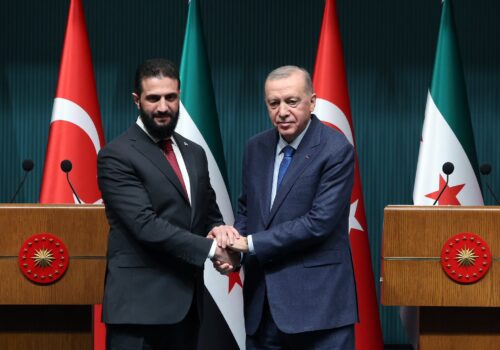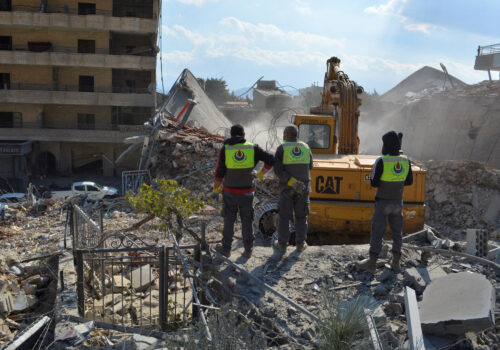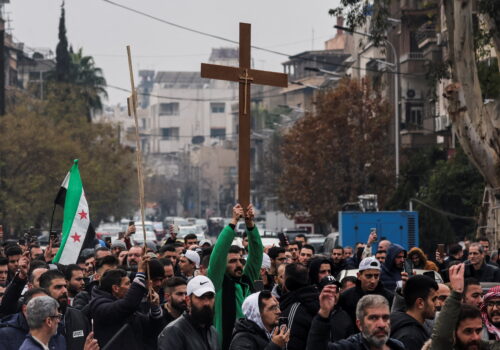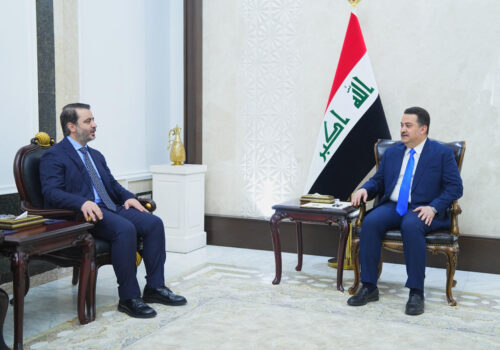Israel is making a miscalculation in southern Syria. Here is why.
Since the December ousting of former Syrian president Bashar al-Assad by Hayat Tahrir al-Sham (HTS)-led opposition fighters, Israel has responded to the prospect of Syrian unification under the new government in Damascus as a threat. Viewing the new Syrian government as “Turkish-backed Islamists,” Prime Minister Benjamin Netanyahu has openly called for the demilitarization of southern Syria, insisting that Syrian government forces should not be allowed south of Damascus. He has also framed Israel as a protector of the Druze community, declaring that Israel would take necessary measures to protect them from threats.
But this is a miscalculation that disregards the region’s demographics and political realities. Israel selectively engages with certain Druze factions in Suwayda while sidelining the predominantly Sunni Arab populations of Daraa and Quneitra. The Israeli aim is to keep Syria as a weak state, divided into autonomous zones drawn along ethnic lines, and to prevent the new Syrian government from uniting Syria.
Within this approach, the Druze and Syria’s south could be Syria’s canary in a coal mine. If the minority group ends up with an autonomous zone, this would set a precedent for other Syrian communities. Other minorities, including the Alawites on Syria’s coast, the Kurds on the Turkish-Syrian border, the Turkmen living in northern Aleppo and Latakia, and the Ismailis in central Syria, might have similar demands. These demands initially appear to be in Israel’s interest as Israel sees a divided Syria as being in the interest of its regional ambitions.
These demands align with Israel’s strategic outlook, as Israel sees a divided Syria as advancing its regional ambitions. However, while Israel has historically pursued the “alliance of minorities“ doctrine—aligning with non-Sunni groups to counterbalance dominant Arab nationalist and Islamist forces—sectarian fragmentation in Syria would invite external meddling and exacerbate internal conflicts, as seen in Iraq and Lebanon. A divided Syria could create long-term instability rather than peace. A weak Damascus would open the space for Iran to reassert its influence and for jihadist organizations to gain ground, potentially forcing Israel to confront a more chaotic and unpredictable security landscape.
Adding to these, Israel’s approach in southern Syria risks deepening sectarian divisions, eroding the Druze community’s standing within Syria, and fueling broader instability. By engaging with select Druze factions while ignoring the political realities of the region, Israel may inadvertently push the Druze closer to Damascus and weaken their negotiating position in Syria’s post-war settlement.
Syria’s South and the Druze
Southern Syria comprises three key regions: Suwayda, Daraa, and Quneitra. Suwayda is the only governorate where Druze form a majority, whereas Daraa and Quneitra remain overwhelmingly Sunni Arab. Any foreign involvement that overlooks these demographic distinctions risks fueling internal divisions. Within the Druze community itself, there is no unified political stance. The community is divided along religious, military, and tribal lines.
The religious leadership of the Syrian Druze is split between three figures who hold the title of Sheikh al-Aql. Sheikh Hikmat Hajeri is a reformist advocating for a secular and decentralized Syria. Sheikh Hannawi remains politically neutral but rejects any separate political governance system for the Druze and rejects becoming a ‘tool in foreign hands’. At the same time, Sheikh Jarbuwa has historically maintained loyalty to Bashar al-Assad, but insiders argue that his loyalty was to Damascus, not the regime. Given this dynamic, the new Syrian leadership may seek a similar arrangement with Sheikh Jarbuwa to counterbalance Sheikh Hajeri’s influence.
SIGN UP FOR THIS WEEK IN THE MIDEAST NEWSLETTER
The fragmentation of the Druze community extends to its military groups. The most powerful militia, Rijal al-Karama, has resisted both the Assad regime and foreign interference. Its spokesperson, Bassem Abu Fakhr, openly rejected Netanyahu’s offer of protection. Another militia, Liwa Jabal, operates less politically but has voiced strong opposition to Israeli meddling and emphasized Druze loyalty to Syria’s unity. Although a relatively small faction, Rijal al-Sheikh al-Karama, led by Layt al-Baloush—the son of Rijal al-Karama’s founding leader—carries significant political weight due to his religious status. Another key figure, Sulaiman Abdelbaki, leads Ahrar al-Jabal and holds a religious position as well.
The issue of integrating Druze militias into the Syrian army remains contentious. While Druze factions prefer to maintain nominal independence until elections are held, the Syrian government insists on disbanding all armed groups to consolidate state authority and prevent another cycle of civil conflict. As a compromise, the Minister of Defense has proposed granting Druze soldiers a special status, allowing them to serve in Druze-majority areas and exempting them from ideological training.
Israel positioning itself as protector of the Druze
Israel claims to shield the Druze from an imagined threat posed by the new Syrian government. The reality on the ground contradicts Israeli claims—Damascus has not engaged in hostile rhetoric. Except for an escalation of violence in Jaramana between government forces and Druze militias that was labelled by Druze leaders as “a personal dispute that developed unexpectedly“, there were no aggressive actions taken against the Druze. Druze representatives have repeatedly met with Ahmed al-Shara and participated in the National Dialogue Conference, demonstrating that they do not view the new government as a threat.
Despite this, Netanyahu has called for the demilitarization of Suwayda, Daraa, and Quneitra, reinforcing Israel’s opposition to any Syrian military presence in the region. Israel’s stance is further complicated by the presence of a Druze community within its own borders, many of whom serve in the Israeli military and maintain familial ties with Druze in Syria. These cross-border connections add a layer of complexity to Israel’s engagement with Syria’s Druze.
For a view from Israel, read more by Gallia Lindenstrauss
Following the announcement, the Israeli air force bombed positions inside southern Syria, prompting a Druze religious delegation to visit al-Shara expressing solidarity against foreign interventions. A more senior visit by Sheikh Hannawi and Sheikh Jarbuwa was cancelled over objection by Sheikh Hajari.
In 2018, the Druze couldn’t count on Israeli military support when ISIS killed over 250 Druze civilians in a single attack in Suwayda.
Coinciding with Netanyahu’s announcement was the formation of the Suwayda Military Council, a militia that claims to protect Suwayda from threats and seeks recognition as part of a future Syrian military structure. The name and flag are clearly inspired by the Military Councils of US Central Command (CENTCOM’s) local partner against the Islamic State in Iraq and Syria (ISIS), the Syrian Democratic Forces (SDF). Though currently very small in size, the Suwayda Military Council could grow if it secures funding to attract economically struggling Druze youth.
Beyond military and diplomatic engagement, Israel may also be leveraging economic incentives to gain influence over the Druze. A recent proposal suggests granting work permits to Syrian Druze to work in the Golan Heights with daily wage offers of seventy-five to one hundred dollars. This is a sizable amount considering that public sector workers in Syria earned around twenty-five dollars per month. While this initiative appears economically in nature, its potential consequences could be strategic. If implemented, it could deepen the divide between Druze and Sunni Arabs, subtly shift the demographics of the Golan Heights, and encourage Druze migration to Israeli-controlled areas.
Backlash against Israeli interference
Israel’s narrative of protecting the Druze has sparked resistance rather than support. Anti-Israel protests have erupted across southern Syria, including in Suwayda, where Sunni Arabs and Druze reject foreign interference in their affairs. In response, the Syrian government has reinforced ties with key Druze figures and military factions, countering Israel’s messaging. Sulaiman Abdelbaki publicly stated his rejection of any external intervention into internal Syrian affairs.
Beyond Syria, regional actors have also raised concerns. Lebanese Druze leader Walid Jumblatt—long-time critic of Israel—has criticized Netanyahu’s policies, warning that “the free Syrians must be cautious of the plots of Israel.“ His public statements reflect a broader skepticism among Druze leaders about Israel’s intentions.
Ahmed al-Shara’s victory against Netanyahu
Recent events in Jaramana, a Druze town just outside Damascus, illustrate the limits of Israel’s strategy. Following an incident in which Syrian General Security personnel were killed in Jaramana, minor clashes erupted between Syrian security forces and local Druze militias. Netanyahu seized on the situation, declaring Israel’s willingness to intervene in Jaramana to protect the Druze.
However, his rhetoric quickly lost credibility when Rijal al-Karama and Rijal al-Sheikh al-Karama deployed forces from Suwayda to Jaramana. Layt al-Baloush, playing a key mediating role, successfully brokered a resolution between the Druze community and the Syrian government. He later announced that the clashes stemmed from a personal dispute and reaffirmed that the Druze reject any Israeli guardianship. Also, the local Druze dignitaries in Jaramana echoed this sentiment, rejecting any Israeli intervention, further undercutting Netanyahu.
In a symbolic move, Syrian military convoys entering Jaramana waived the Druze flag, signaling respect for the community’s identity and further undermining Israeli narratives. Ahmed al-Shara emerged from the incident as a leader capable of resolving disputes with the Druze, bolstering his domestic legitimacy and discrediting Netanyahu’s portrayal of the Syrian government as a threat.
By working with Druze leaders who reject Israeli involvement, while benefiting from anti-Israel sentiment among the Sunni Arab populations of Daraa and Quneitra, al-Shara may gradually dismantle Israel’s vision of a divided Syria.
Consequently, al-Shara negotiated an agreement with the armed Druze factions and leading Druze figures, a mechanism to recruit Druze policemen from Suwayda to operate in Suwayda in the name of the Syrian state. Even though recruitment began, Sheikh Hajari opposed the agreement, which foresaw the full integration of Suwayda into Syria.
A defining moment
For Syrians in general, the Israeli ambitions are of serious concern. Exactly when most Syrians hoped that their 14-year struggle to topple the Assad regime ended and that they would be able to rebuild Syria, Israel positioned itself as a spoiler. The Israeli actions vis-à-vis the Druze and southern Syria may torpedo Syria’s security, which is essential for the return of Syrian refugees.
If Israel succeeds in persuading the Druze to oppose Damascus and disengage from the political transition, the consequences could reverberate for decades. Israel has allocated significant financial resources—up to one billion dollars—to strengthen its influence over the Druze community. If parts of the Druze leadership align with Israel against Syria’s territorial integrity, the community risks political and social isolation both within Syria and across the region. Such a move would not only weaken their position in Syria’s future but could also strain relations with their counterparts in Lebanon and the broader Arab world, where they may be perceived as complicit in foreign interference.
Conversely, the choices made by Druze leaders will determine whether they become a force for national cohesion or a source of further fragmentation. If the Druze prioritize integration within Syria and seek an arrangement through dialogue with Damascus rather than external actors, they could emerge as key stakeholders in the country’s unity and stability. Their engagement in the political process would not only reinforce Syria’s territorial integrity but also position them as champions of national reconciliation.
To either end, it appears that most Druze leaders are wary of the stakes.
Ömer Özkizilcik is a nonresident fellow for the Syria Strategy Project at the Atlantic Council’s Middle East Programs. He is an Ankara-based Turkish foreign policy, counterterrorism, and military affairs analyst.
Further reading
Tue, Mar 25, 2025
Dispatch from Bekaa: Inside the sectarian skirmishes on the Syria-Lebanon border
MENASource By Nicholas Blanford
Local Shia tribesmen have battled an assortment of Sunni jihadist militias and the new Syrian security forces dominated by Hayat Tahrir al-Sham (HTS).
Wed, Mar 19, 2025
Inside Hayat Tahrir al-Sham’s diplomatic offensive with Syria’s Christians and Ismailis
MENASource By
HTS’s diplomatic offensive demonstrates the leadership’s political approach, which evolved over years of engaging with the Christian and Druze communities in Idlib.
Wed, Mar 19, 2025
Why the United States must bridge the Iraq-Syria divide
MENASource By Sarkawt Shamsulddin
With leverage over both capitals, the United States emerges as the linchpin in delicate diplomatic moment between Baghdad and Damascus.
Image: Israeli Paratroopers' Brigade members operate in a location given as the Syrian border, in this handout picture released on December 13, 2024. Israel Defense Forces/Handout via REUTERS THIS IMAGE HAS BEEN SUPPLIED BY A THIRD PARTY




